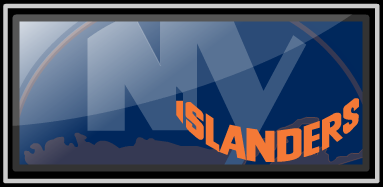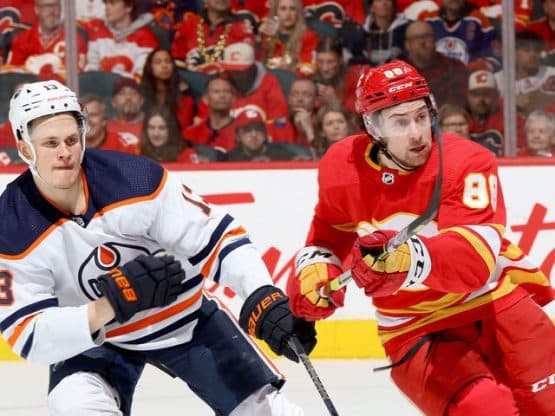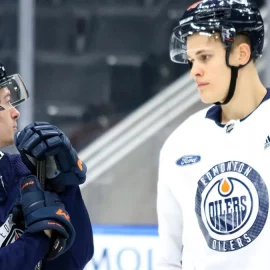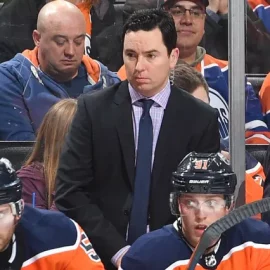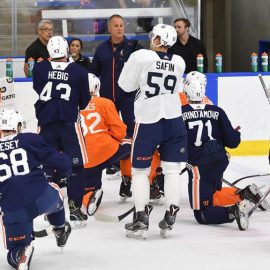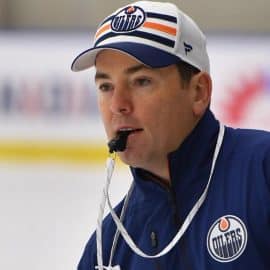Here’s Bruce at the public observatory at Telus World of Science, Edmonton. He gets to play with giant, intricate instruments and that’s pretty damn cool.
You know what else is cool? Bringing some empiricism and level-headedness to hockey’s many lines of discussion. That’s basically Bruce’s operating philosophy. And, I suspect the reason Bruce is so damn good at doing this lies in his other life as a starry messenger. You see, Bruce happens to be a many-times published author of scholarly research in the field of Astronomy (have a go at one of his pieces here). I think you can see the same rigorous attention to detail Bruce provides in his Astronomical work as you see in his hockey-related writing.
As an example of Bruce’s rigor and attention to detail, have a look at this pair of scouting reports on the then highly regarded 2014 draft prospect Leon Draisaitl (here and here). If there’s a more in-depth, yet balanced, limited viewing scouting report of a player, I’m not aware of it.
One of the scratching posts of Modernity is Galileo’s publication of The Starry Messenger (1610). It wasn’t so much the discoveries (great, unusual, and remarkable spectacles!) made by Galileo that did the work of turning the page on an era, but the method he employed, what we commonly refer to as the scientific method. In lay terms, Galileo observed the cosmos meticulously, without bias and recorded his findings and the tools he employed to achieve them. This allowed others to test his observations and attempt to falsify them through their replication. One of the more intriguing parts of The Starry Messenger is Galileo’s description of his efforts to construct and test to precision a telescope.
While the metaphor may be strained, Bruce, the lover of telescopes, is no stranger to exploring new tools and getting the most out of them. When Hockey Canada released its roster for the Olympic team this year, a great deal of teeth-gnashing revolved around a number of the decisions. Rather than storm into outrage, Bruce calmly saw the issue as a question to be answered. In his characteristically rigorous and empirical manner, Bruce took up the new tools afforded by Rob Vollman’s player usage charts and tried to understand the logic of Hockey Canada’s decision making. Without holding the hand of authority, Bruce made his case in a complex, interesting and reality-based article.
Bruce brings the online hockey community an attention to detail and a willingness to explore new tools and ideas as long as they stand up to rigorous scrutiny. It’s a pleasure to have him take part in our series here at the Rig. Thank you kindly, Bruce.
For your listening pleasure as you read this profile, Bruce suggests (appropriately, I might add), the first track from Genesis’ 1972 album, Foxtrot, “Watcher of the Skies.”
[youtube http://www.youtube.com/watch?v=Mi3vD5ki1bE&w=420&h=315]1. When did you start writing about hockey? What got you into it?
Way back in the Original Six days when my own age could also be described with a single digit, I used to write (in pencil!) fake newspaper stories about games I watched. Headline, subhead, drawn pictures (all featuring pucks bulging twine), caption, multi-paragraph story. Boilerplate stuff, but I was fascinated with the process even then.
Then for about 15-20 years I wrote a newsletter for my “keeper league”, the National Eternal Hockey Draft (founded in 1979, still going strong). We were all Oilers season ticket holders to start, but inevitably folks moved away even as we still meet up every October for the draft itself and remain lifelong friends. I’d write monthly updates that included draft & NHL content, send them by snail mail or later, email. I used to write very similar stuff about things like the IIHF World Seniors or the Oilers Rookies vs. Golden Bears game back in the ‘90s as I do now. Great training, with exactly 9 readers.
On the Internet, I joined the Hockey Analysis Group and also a BBS-style chat room, but found the Oilogosphere a little later than some. I started as a commenter on Lowetide’s and MC79hockey’s blogs in the spring of 2008 and kicked off my own, Oil Droppings, that fall. I moved to Copper & Blue in 2009, and to Cult of Hockey in 2010.
2. Are there any writers that you look up to? If so, who are they and why?
Oh boy, tonnes of them, and for lots of different reasons. My original hero was Scott Young (father of Neil) who wrote “The Leafs I Knew” way, WAY back in the day when the Leafs were actually good. Young’s prose featured many great turns of phrase within a hockey context, and a knack for presenting high-level athletes as real people rather than icons. Peter Gzowski’s “The Game Of Our Lives” is a personal favourite, as is Randall Maggs’ “Night Work: The Sawchuk Poems.” The love of the game permeates all these works.
I’d be remiss not to mention Bill James. While not a hockey guy per sé, his annual “Baseball Abstract” was hugely influential on my whole way of thinking. James was on the vanguard of analytics, generating copious volumes of numbers, words, and ideas in equal measure. I continue to apply some of his principles to my research and writing in my other passion of astronomy as well as hockey.
On the Oilogosphere I admire Allan Mitchell’s ability to generate content at Lowetide every single day, and to maintain (& occasionally moderate) a civilized discussion in his comments section, no mean feat at times. I’ve long been a fan of Scott Reynolds’ work over at Copper & Blue, and indeed by the stable of fine writers who have written under that banner. The Oilers’ Rig is another must-stop location that has emerged more recently with numerous strong contributors including, to name but one, Romulus’ Apotheosis. I also enjoy being challenged by some of the more analytical thinkers such as Tyler Dellow of the former MC79hockey, Michael Parkatti of Boys on the Bus. A long-time favourite is Pat MacLean of Black Dog Hates Skunks, a more lyrical writer who is a (sometimes “guilty”) pleasure to read. Numerous other stops both within and beyond the Oilogosphere. Too many to name, I know I’m forgetting somebody important.
Closer to home, I’ve long followed Jonathan Willis at his various locations, and am proud to consider him a colleague at Cult of Hockey. I also admire David Staples for his long-term “alternative statistics” projects, huge undertakings which don’t always get the respect they deserve but which provide a different, often complementary, take to more mainstream analytical methods. The Oilogosphere is chock-a-block with original thinkers and approaches, which is what drew me in to the ‘sphere in the first place.
Among mainstream media writers, I have followed Jim Matheson for his Oilers’ coverage for decades and Cam Cole for almost as long. More recently, writers like Bruce Arthur and (former blogger) James Mirtle have climbed the charts.
Lastly, for pure reading enjoyment I have to give a stick tap to Ellen Etchingham of A Theory of Ice and the late, lamented Backhand Shelf. She has a way of making me care about stuff I had never stopped to think about, or didn’t know existed.
3. If you could give any advice to people interested in getting into writing about sports…what would it be?
If you find your heart and your head on the same page, write on that page. When they are not in full agreement, take the time to explore both sides of the issue and try to present a balanced view, lay out the facts but still leave room for a personal opinion at the end. When that opinion gets challenged, be willing to have a frank exchange of views; as long as the conversation — from both sides — is civil and speaks to the issue at hand, that’s great. As my dad used to say, “credit others with having equal intelligence, at least until they prove otherwise!” Indeed, it’s this ability to converse with fellow fans and followers of the game that puts the Internet ahead of traditional top-down media in my view. Better a conversation than a lecture (unless Dr. Einstein is in the room, in which case I’m all ears!)
4. Do you specialize in types of writing (analytical, post/pre game blogs, prospects, opinion pieces…all of the above)?
All of the above and more. I really enjoy historical writing. As an “old goalie”, my trilogy of C&B posts about Original Six goaltending legends Terry Sawchuk, Jacques Plante, and Glenn Hall remain among my favourites. (The one about Johnny Bower is still on the drawing board.) In recent years I’ve gotten more into the future than the past, following Oilers’ prospects closely and having had the opportunity to interview many of them. The most challenging was Martin Marincin’s first English-language interview; his interpreter (Czech teammate Jaroslav Vlach) was injured and missed the Alberta road trip, so Marty was on his own. Funnily enough, every single question was longer than its answer!
5. Do you have a favorite article that you’ve written or one that got a lot of positive feedback or criticism? Tell me a bit about it.
Some of my best work came while tears were being shed, such as my coverage of the Lokomotiv Yaroslavl plane crash or the drowning of Oilers prospect Kristians Pelss. Quite aside from the unfortunate details of his tragic passing, I’m proudest of a piece I wrote celebrating Pelss’ life. I got lots of nice feedback on that from people who knew him personally which meant a lot.
Something similar happened when I wrote a more recent piece about the passing of Tore Purdy a.k.a. analytics whiz “JLikens”, although that time I chose to write with many voices, not just one. Such is the nature of Twitter (not to mention the copy-n-paste function) that in special circumstances it is possible to raise a chorus under a single byline.
6. What sites do you currently write for? Favorite team(s)?
Cult of Hockey, with occasional guest appearances at Copper & Blue. I have favourite teams in many sports, but in hockey this Edmonite is strictly a homer: Oilers (& affiliates), Golden Bears, Oil Kings, Team Canada.
7. Where can we find you on social media? Twitter/Facebook etc.
I’m on Twitter @BruceMcCurdy (original, eh?)
[adsanity id=1808 align=alignnone /]Add The Sports Daily to your Google News Feed!
